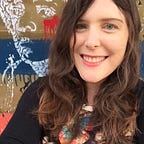You have permission to change
Yesterday, I was hanging out with a friend of mine who is in the midst of a career change. She was excited by the work she was doing, but worried that she might look directionless to potential employers.
“You should read the blog post I’m publishing tomorrow,” I told her. “It will be called ‘You have permission to change.’ It might be something that’s useful for you to hear.”
“Of course, as with most things people write,” I added, “I’m writing it because it’s something *I* need to hear.”
If my friend’s concern is with looking flaky, my own trepidation is more existential.
Part of the way we form our sense of identity is by telling ourselves stories: about who we are and what we do. I write about this a lot in The Sex Myth. How we can become wedded to a perception of ourselves as sexually liberated. As adventurous. As someone with a high sex drive. As a “good girl.” As someone who can attract whoever they want. As someone who can’t attract anyone they want. As monogamous. As straight.
And how when the facts of our sex lives rub up against the stories we tell ourselves and others — as they inevitably do at some point, for most of us — we experience a kind of inner conflict. We are told that these stories matter, after all. That it means something to be someone who is comfortable with having casual sex, or someone who isn’t comfortable with it, or someone who isn’t having sex at all.
Sex isn’t the only arena in which we tell ourselves these stories. You might be deeply attached, for example, to the idea of yourself as an extrovert, but find yourself sometimes wishing everyone would just go away so that you can have some time to yourself. Or you might be attached to the idea of yourself as someone who is economically disadvantaged, even if in your current situation you are quite well off.
For me, the story I’m having trouble disentangling myself from is the one in which I am a Writer.
I’ve been a writer, in the professional sense, for more than 10 years. I started writing professionally when I was fresh out of university, writing opinion pieces for my city’s local paper, then writing for women’s magazines and becoming a political editor, then embarking on the long journey of writing a book, and starting a blog that would amass 100,000 subscribers at its peak.
When friends introduce me to people, they say, “This is Rachel, she’s a writer.” But when it comes to writing as a verb, rather than as an identity — as something I do on a daily basis rather than something I have done — the story of me as a writer is one that feels like it is set increasingly in the past.
This year, over the summer, I quietly wrote a good chunk of a novel. I wrote a handful of articles for publications I liked, when topic excited me. I published essays in two new books. And I wrote (and rewrote) a whole lot of speeches. But the main part of my year was spent travelling and giving talks, not writing. And next year, I will be writing even less.
If you read my Tinyletter, you’ll know that this year The Sex Myth was made into a devised theatre show, created by a young Boston director named Hanne Larsen. In 2017, I’m throwing myself wholeheartedly behind helping the show spread.
Hanne and I have created a playbook detailing the process she piloted, which we’ll be distributing to colleges and community groups from February onwards, and I’m working on getting a New York City production off the ground in the summer. After that — London? Toronto? Sydney? I’m picturing a flowering of Sex Myth plays, big and small, around the world. And of course, I will be continuing to speak at colleges and universities around the US (and anywhere else people want to bring me) in 2017.
Like my friend who is changing careers, I am so excited and energised by this work: both the work I did this year, and the projects I will be working on next. I come home every day bubbling over with ideas and a sense of possibility. I feel valued, and I feel like I am offering other people value.
Whereas working as a writer often feels like implicitly asking people “Do you think I’m interesting?” (which, let’s be honest, is a pretty self-defeating question to ask) the work I’m doing now feels like “I am giving you this gift because I think you’re interesting, and I want to hear what you have to say.” And that shift enables me to be a much more powerful advocate for the ideas I care about.
It is not surprising, perhaps, that the things that sustain us and give us life change as we do. Still, it feels strange to no longer want the things I wanted for so long, and to cede the identities in which other people find value in me.
What is the word for what I’m doing now? Activist? Producer? CEO?
I don’t know, but I do know that “writer” feels disingenuous.
PS And a question: What changes are you making in your life as you contemplate the New Year? What identities and self-perceptions are you ceding? And how do you feel about that?
